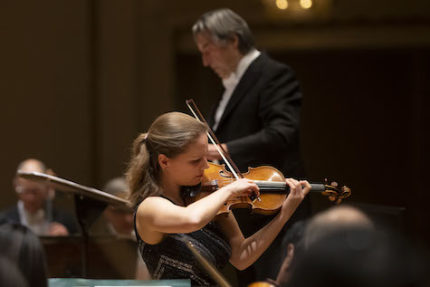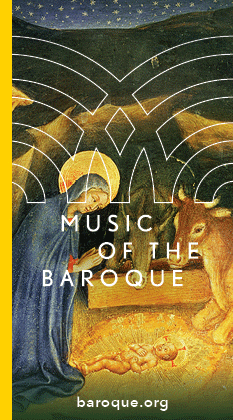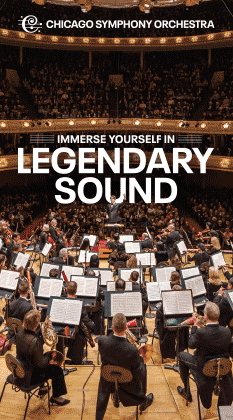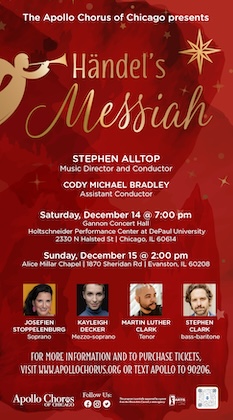Chicago Symphony does wonders for a pair of Schumann and Tchaikovsky orphans

Two unloved pieces by composers in the Western pantheon made up all of Thursday night’s program from the Chicago Symphony Orchestra—an evening that argued we ought to find space in our hearts, if not our everyday playlists, for these two oddballs.
Schumann’s only Violin Concerto, with Julia Fischer soloing, and Tchaikovsky’s “Manfred” Symphony were the ingredients in this stew of imperfect produce. The conductor was the CSO’s lame-duck music director, Riccardo Muti, a champion of the neglected works of non-neglected composers.
With no overture or short work preceding the Schumann concerto, conductor and soloist walked on to the Symphony Center stage together. Fischer, in sparkling silver-and-black gown, looked amused by Muti’s insistence on passing her on the downstage side en route to the podium, and by something he whispered to her pre-downbeat.
After an antsy orchestral opening, with uneasy rhythms and unfocused dynamic framing, Fischer stepped up to claim the audience’s full attention—this despite Schumann not providing the soloist with a motto for a memorable first entrance. Fischer nevertheless played with a gorgeous singing tone in lyrical passages, enhanced by the yearning, dark quality of her instrument’s lowest register. Double stops on perfect intervals pealed with precise intonation. Drama infused the hushed moments.
The heartbreaking second movement makes the strongest case for the whole concerto. The plangent melody—a masterpiece of deferring the moment of resolution—took on a wandering, misty character under Fischer’s bow, and the dialogue between her and principal cello John Sharp pined as if for something unreachable. In solo piano, in art songs, and in movements like this, Schumann shows his acuity with miniatures. If only the movement were longer, with more time to soak in string sound.
There wasn’t even an luxuriating pause, however, as the third movement starts attacca out of the second, with Muti directing a change in character striking enough to signal the start of another movement. The jolly opening theme carried bonhomie, possibly also because some of the orchestra smiled toward Muti and Fischer as if they were remembering a joke.
This final movement, while not really a theme and variations, does obsess over a single line, which the violin spins out in different ways after each statement. Schumann’s widow, Clara, and his friend Johannes Brahms buried the concerto after his death, saying it showed evidence of the mental illness that would overtake him, possibly due in part to the perseverant quality of this last movement. (The concerto was premiered only in 1937, more than 80 years after Schumann’s death. The CSO didn’t play it until 1996.)
To Fischer’s credit, she imbued each answer to the repeated statement with shades of difference, some more jaunty, some more dizzying, some with a lovely cantabile quality up into the highest register. To Muti’s credit, he kept the orchestra’s dynamics sensitive to the challenges in Fischer’s part, and the soloist finished with an elegant, understated flourish.
During the applause, she crossed the podium to shake Sharp’s hand in acknowledgment of their duets. Although the audience clapped through a few curtain calls, she did not offer the encore the audience wanted.
Tchaikovsky’s “Manfred” Symphony, an hour-long programmatic piece based on Lord Byron’s dramatic poem, hulked across the second half. The piece has four movements, albeit not with standard tempo organization, and a large orchestra, making it sort of Tchaikovsky’s Symphony No. 4.5 — coming between the more popular Nos. 4 and 5 chronologically. Muti has advocated for the work, notably scheduling it in his full survey of Tchaikovsky’s symphonies with the CSO in 2014-15.
It’s a piece well suited to Muti’s interpretive abilities. He’s adept at bringing out the colors of inventive orchestration, as with the croaky low strings in the opening, the full strings’ sumptuous entrance, and distinguished wind chorales—and that’s just the first movement. The strings glowed when they should and ached when they should. The shifting of mood through the allusions to Manfred’s story are operatic, and you can believe the man on the podium has spent a lot of time at La Scala.
The first movement, in particular, packs a lot of excitement, especially in its finale, with big drums and accents in shorter and shorter groups. In the space between the first and second movements, muttered wows passed through the audience. It’s an impressive enough musical moment that we ought to clap, as tradition permits after the first movement of Tchaikovsky’s Violin Concerto.
The second movement passed through skittering flutes and some fine, buzzy unison ensemble playing. Tchaikovsky’s creative use of the harp—played by Allegra Lilly, guest principal on loan from St. Louis— finished with some clever plinks and a flitting violin that left some delighted chuckles in the post-movement silence.
The stormy opening of the fourth movement followed a soothing third. As with the Schumann, the final movement is the head-scratcher. Midway through the movement, thin, transitional-sounding music leads into . . . more thin, transitional-sounding music. There’s suddenly a fugue that doesn’t usher in a climax. A raucous crescendo with the return of Manfred’s motif in the horns ends, and the bassoons start up yet another episode that feels disconnected. A lot of time passes through a lot of ups and downs and starts and stops when you already feel like the end of the piece must be near.
The true ending begins with the entrance of the organ, whose player has sat on stage in silence for an hour waiting for this moment. Patrick Godon, the organist, entered with a clangorous orchestral registration for the big chorale chords that cap the piece. Recognizing that not everyone has this reaction—composers keep using the organ in finales this way, after all—but for some listeners the sudden, uniform blaring of a keyboard with pipes over the burnished, free-tuned sound of an excellent orchestra flattens out the whole experience.
The large woodwind section, having played beautifully and with versatility throughout the symphony, fittingly gets the last word. The percussion section, also, deserves a shout-out for its deftness with a large battery of instruments. Principal percussionist Cynthia Yeh played tambourine in a remarkably precise and practiced way far removed from the instrument’s stereotypical role as leg-slapping accompaniment for back-up singers.
The Schumann concerto and the “Manfred” Symphony aren’t perfect pieces; both, in fact, have undergone edits applied by other musicians to high-profile performances. But with this orchestra, this conductor and this soloist, these versions are about as good as they come.
The program will be repeated 8 p.m. Saturday. cso.org
Graham Meyer covers Chicago culture as a reporter and critic, with a focus on classical music. He writes the weekly events column “The Big Ticket,” for Crain’s Chicago Business, about area theater, music, art, dance and more. For Chicago magazine, where he was on staff 2005-2011, he has reviewed restaurants, previewed concerts, and edited or co-edited “Best of Chicago,” “Salaries,” and the “Our Lake” feature on Lake Michigan’s place in the city’s life. In addition to being a journalist, he is a choral singer, pianist, composer, and crossword-puzzle constructor.
Posted in Uncategorized





Posted Feb 25, 2023 at 9:22 am by W. L. Weller
It’s a real treat to go to a concert and hear non-standard repertoire played so well. I thoroughly enjoyed the Friday afternoon program.
Posted Feb 25, 2023 at 10:56 pm by Howard C
Recordings generally don’t do the Manfred Symphony justice. This live CSO performance under Maestro Muti gives it the unity, spunk, and drama that is required to make this especially captivating. After hearing David Cooper play in this concert, I am left still mourning his potential departure… David does his own remarkable thing and seems to fit well musically – it is not realistic to expect a carbon copy of Dale. Before he was selected as 1st horn, other principal horn fill-ins didn’t match what he currently provides. As an audience member, I consider him a keeper but what do I know…
Posted Feb 26, 2023 at 7:46 am by Lewis
Also saw the Friday concert and enjoyed it a lot, even though I was not familiar with either piece. The Tchaikovsky, while not in the same league melodically with many of his other works, was nevertheless strong and compelling in this performance.
Posted Feb 26, 2023 at 8:20 am by Charles Spencer
I was thinking during the climax of the Manfred Thursday night – if this is not the best orchestra in the world, what is?
Posted Feb 26, 2023 at 10:38 pm by Martha Pollak
Didn’t Julia Fischer play a Paganini piece as her encore?
Posted Feb 28, 2023 at 10:00 am by Graham Meyer
Hi, Martha—the CSO tells me Fischer played Paganini’s E-flat major caprice, Op. 1, no. 17 on Saturday night. I was there on Thursday, when she didn’t play an encore.
Posted Feb 28, 2023 at 5:08 pm by Peter DG
There was no encore for the Friday matinee. Wish there was because melodically and engaging music wise generally I found the Schumann disappointing. The virtuosity of the violin playing is phenomenal and seems like quite a strain on the violinist, so maybe expecting an encore may be asking too much. Also the applause was not that enthusiastic from this matinee crowd.